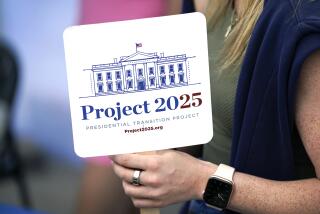‘Reformer’ Gore Promises a ‘Smaller, Smarter’ Government
LITTLE ROCK, Ark. — Casting himself as the true reformer in the race for president, Al Gore proposed Tuesday a four-year hiring freeze and increased use of the Internet to create a leaner, more efficient federal government.
Delivering the first of a series of policy speeches aimed at sharpening contrasts with George W. Bush as the campaign closes, the vice president touted the “reinventing government” initiative he has headed throughout the Clinton administration. He said the effort has created the smallest bureaucracy since President Kennedy was in office and he promised to continue the trend if elected Nov. 7.
“For eight years now, I’ve worked to reduce the size of government,” Gore told an audience of about 200 invited guests here in the capital of Clinton’s home state. “And my mission as president will be to promote choice and change while making government smaller and smarter than ever before.”
By no mere chance, the Democrat’s remarks came as Texas Gov. Bush embarked on his own “barnstorm for reform” tour, portraying Gore as a champion of bigger government. “He’s the biggest spender we’ve ever had in the history of politics,” Bush said Tuesday.
But Gore insisted it was Bush who has been profligate in boosting the size of Texas’ state government, and he asserted that the federal government would grow by up to 100,000 new employees under Bush’s proposal to partly privatize Social Security.
“I know my opponent would like to run against a mythical big-spending, big-government candidate,” Gore said. He dismissed that portrayal as “a cartoon image from campaigns past,” later adding, “I am the one who believes in limited government--and I have believed in it long before it was fashionable to do so in the Democratic Party.”
Specifically, Gore said he would reduce the size of the federal bureaucracy over four years by allowing positions to go unfilled once they come open. “I’ll make this clear pledge: As president, I will not add to the number of people doing work for the federal government--not one position.”
Later, he told reporters that the military would not be downsized but that civilian ranks at the Pentagon might shrink.
Gore also promised a pay-for-performance plan for management workers that would base raises in part on how well they serve the public. And he vowed to put more government services online. “You should never have to wait in line or get stuck on the phone to apply for a student loan or get information on how to choose the best public school for your child,” said Gore, who--charges of embellishment aside--did play a significant role in expanding the Internet.
As Bush continued to press his big-spender attack, a campaign spokesman said the vice president had exaggerated the achievements of his reinventing-government initiative. “The smaller federal government he takes credit for has largely come from cuts his administration made to the military,” said spokesman Dan Bartlett.
But one expert said the quibbling is somewhat beside the point.
Ronald C. Moe, a Library of Congress specialist in government organization, said the argument over the size of the federal work force ignores the increased use of private contractors as well as the growing role of state and local governments in providing public services. “The government does more than it did 20 years ago because it serves more people than it did 20 years ago,” Moe said.
But with just 14 days left until the election, such distinctions were lost in the grappling for political advantage.Gore reiterated accusations that Bush’s proposed $1.3-trillion tax cut would result in renewed deficits and possibly pitch the economy into recession. Countering one of Bush’s frequent charges, Gore said: “I don’t ever want to see another era of big government. But I certainly don’t want to ever see another era of big special interests that wield more power than the American people.”
Taking after the governor’s record campaign bankroll, Gore said: “The roughly $100 million raised by Gov. Bush . . . came in part from a new generation of special-interest power brokers who would like nothing better than a pliant president who would bend public policy to suit their purposes and their profits . . .”
Gore’s speech was sandwiched between boisterous rallies in downtown Little Rock and in Shreveport, La., where the vice president continued efforts to reel in states that Clinton carried handily.
From Louisiana, Gore flew to Tennessee for an appearance with running mate Joseph I. Lieberman at their campaign headquarters. Bush has been strongly competitive in Tennessee, but Gore professed not to be concerned. Speaking to reporters aboard Air Force Two, he said, “I feel good about my home state, but Tennessee has always been close. It was close in ’92. It was close in ’96 . . . . It’s always a state where you have to campaign hard and, you know, there’s nothing new about that.”
More to Read
Get the L.A. Times Politics newsletter
Deeply reported insights into legislation, politics and policy from Sacramento, Washington and beyond. In your inbox three times per week.
You may occasionally receive promotional content from the Los Angeles Times.











